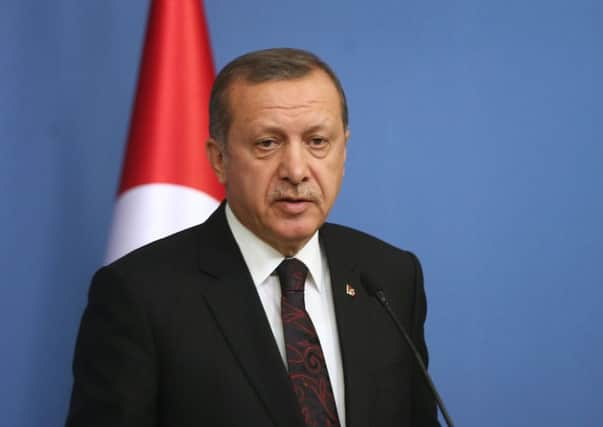Turkey tries 26 for using web to urge protests


They join an estimated 5,500 people on trial in 95 prosecutions, including some on terrorism charges, said Turkish rights groups.
The charges are linked to the unrest that challenged prime minister Tayyip Erdogan’s decade in power.
Advertisement
Hide AdAdvertisement
Hide AdIn the latest case, five defendants deny forming a criminal organisation. If found guilty they face up to 30 years in prison.
The charge cites messages on social-media websites that urged people to join public protests.
Once Turkey was considered as a contender for European Union membership but under Islamist Mr Erdogan’s rule Twitter and YouTube are periodically banned and more journalists were held in jail in Turkey last year than in anywhere else in the world.
“It is an absolutely scandalous prosecution that should have never been brought to court,” said Andrew Gardner, Turkey researcher for Amnesty International.
“The indictment is completely without evidence of a crime, in the understanding of international human rights laws and Turkey’s own laws.
“The right to peaceful assembly is being put on trial.”
Most of the defendants are part of Taksim Solidarity, an ad hoc collection of professional people and activists who opposed Mr Erdogan’s plans to redevelop Taksim Square, including razing Gezi Park to build a shopping centre.
The campaign to save Gezi mushroomed into nationwide anti-government protests in June 2013. At least six people died in clashes with police, and the Turkish Medical Association says 10,000 were injured.
Thousands of other defendants face charges mainly to do with violent incidents that occurred during the unrest.
Advertisement
Hide AdAdvertisement
Hide AdMr Erdogan has depicted the protests as an international conspiracy meant to topple him.
He remains Turkey’s most popular political figure and is widely expected to run for president in an August election.
His support largely stems from the conservative Muslim heartlands of Anatolia, where he won votes for overturning Turkey’s secular laws.
“This trial is the government’s effort to discredit the Gezi movement… but the reality is: Taksim Solidarity awakened public opposition dormant since the 1980 [military] coup,” said Melda Onur, an opposition politician from the centre-left Republican People’s Party.
Mr Erdogan’s critics say the government is using courts to discourage political dissent.
“There is no question there is an atmosphere of intimidation and creation of a fear psychosis within society,” said Amnesty’s secretary-general, Salil Shetty.
Sporadic protests have hit Turkish cities over the past year, but their size has dwindled.
On the 31 May anniversary of the start of the Gezi protest, a reported 25,000 police fired tear gas to disperse a crowd of about 1,000 people near Taksim trying to commemorate those who had died in the unrest.
Advertisement
Hide AdAdvertisement
Hide AdThe indictment said some protesters last year used bottles and rocks to repel police trying to clear Gezi Park, and that other groups built barricades, threw petrol bombs and ballbearings and used percussion bombs.
But US-based Human Rights Watch said: “Just a handful of officers have faced any kind of criminal prosecution for excessive use of force and their role in the deaths of three protesters.”